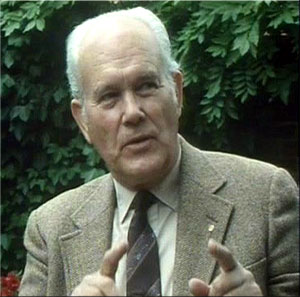
Fletcher Prouty
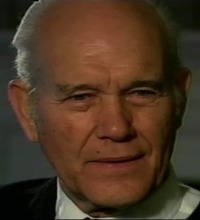
This subject which I am going to get into I might call the anatomy of assassination or the politics of assassination. Assassination is a big business. In fact, assassination is the business of big business. I’ve written quite a bit on this subject in various magazines and for those of you that have managed to get past some of the pictures that occur in some of those magazines, you’ll know that in the November issue of Genesis I wrote on the subject of the Kennedy assassination. Just last month—March issue of Genesis—I wrote about international assassinations. And I have to write five months ahead of time. I have an article completed and in the mail on the 24th of March on assassinations in which I talked about the possibility of further assassinations in the Middle East. And as I went to the Post Office on the 25th with a newspaper under my arm about the assassination of King Faisal, I had the intention of taking the article back home and bringing it up to date. You see it’s that kind of a subject.
What was your first thought when you read about the assassination of King Faisal? What goes through the minds of the perpetrators of assassinations? Are we again confronted with a young man who was a lone nut; who kept a diary and friends on a grassy knoll down there in Saudi Arabia? Or was the King killed by some sort of a machine or conspiracy that had other plans for actions in the Middle East? Mr. Kissinger had left the Middle East the day before. Mr. Nixon had tallied in Dallas until the morning of the assassination.
So there’s a theme running through these things that the King is dead. But, what is the meaning then of the controls that go through these things. In this case the resumption of power in Saudi Arabia almost seemed to be a little too even, too easy. What had really happened there? And I think what had really happened there will give us a picture of what goes on in assassinations: how they come about; and then we can take that kind of a picture and begin to unravel some of the others and we might come a little closer to the mark.
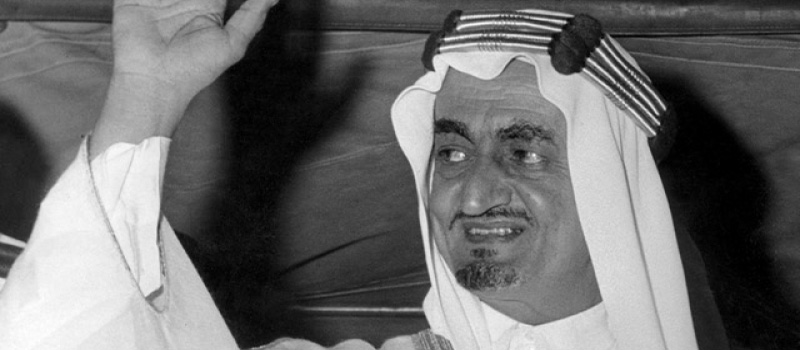
Technically what happened in Saudi Arabia is that the King’s guard, the King’s elite, was broken. Now you can keep a man alive. If you don’t believe that read your history of General De Gaulle. Even in the deepest and darkest days of World War II there were thousands of people who would like to have had a shot at De Gaulle. I remember after the Cairo conference in Marrakech, Morocco, Churchill was recovering with a bout with influenza and DeGaulle came to visit him several times. You can’t imagine the security precautions that were taken in Morocco to keep the good General alive. I was in Lima, Peru, in March of 1964 when DeGaulle came and captivated the country of Peru. Hundreds of thousands of Peruvians filled Plaza De Armas to such an extent that they were pressing against the walls and trampling the trees. And yet General De Gaulle, though a good many inches taller than I am, walked among these Peruvians that night with search lights on him in that huge arena—among hundreds of thousands of people—and there wasn’t a person [who] took a shot at him. Because in the six months…six months before he went to Lima…the people whose business it was to keep De Gaulle alive—The Guerillas, if you remember their term of endearment—had thoroughly worked over the city of Lima; had combed every list for people in that city who might be anti-Gaullists; had provided them with resort hotels a long way off; and had made sure that when the General came to town he would stay alive.
What is it then that keeps these people alive? In every country the King would not live if there was not an elite guard. And who trains the elite guard? The Vinnell Corporation.
It seems to me that there’s a point to the subject which appeared just a little while ago in The New York Times, the Washington Post and a great number of other papers, to the effect that there had been a contract issued with the Vinnell Corporation—and I don’t have any idea what their corporate connection’s are—and the Defense Department of the United States; and the fact that the Vinnell Corporation had signed this contract for the purpose of training, first of all, the National Guard of Saudi Arabia—and National Guard there means, more or less, police; and the King’s elite guard. I wonder which king they had in mind? Because when you control the elite guard of a country—when you train that guard; when you arm that guard; when you teach them to jump from an airplane at Fort Benning and in Fort Bragg give them all kinds of weapons training and bring them down to Camp Perry in Virginia where there’s a nice little resort: That guard knows how to keep a man alive, as long as that guard agrees to keep that man alive.
So I don’t know whether the death of King Faisal preceded the work of the Vinnell Corporation or whether the Vinnell Corporation’s contract began on the 25th of March, but it’s awfully important. Because whether those men stay alive or not is the function of their inner guard—because once you relax the guard you open up a hornet’s nest. A lot of people would like to control the bank accounts of Saudi Arabia and Kuwait and all the rest of them. And what keeps the King alive is not the election of the populous—because they don’t go through that routine over there—it’s simply his guard. So this is a key to it. And the guard in many of these countries throughout the world where there have been so many coup d’etats—a euphemism for the work of mechanics or assassination—these guards for many, many years in my experience, for more than twenty-five years (I was in Saudi Arabia in 1943 on clandestine activities) is the work of the Central Intelligence Agency. Then the people who let the contracts for the Central Intelligence Agency are called the Department of Defense. And the people who do the work are called such companies such as the Vinnel Corporation or Air America or some of these others. So you begin to see what comes about. And since I didn’t come here this afternoon to really get into the assassination picture too deeply, I wanted to “set a stage” for it.
So let me jump to some of the things that we know about without having to dig too far under the surface. In 1953 the CIA had a problem, only this time it was in the country of Iran and Mossadegh died of lead poisoning; and the Shah, who was escaping to the Riviera, was brought back to resume the long 2500 year line of Cyrus, King Cyrus, and now he leads the country of Iran at the pleasure of the Agency’s number one man in the world today, Richard Helms, who is called Ambassador. And so as long as the guard in Iran can keep the Shah alive, he’ll be our man there. And as long as the Shah is our man, he’ll probably be alive. In Jordan, where King Hussein jets around and lives by grace of his elite guard—that guard has been trained through various corporate devices by the Central Intelligence Agency for at least twenty years—and King Hussein has at about the same chances of surviving that Faisal or Hassen or the Shah have, and that is: If he plays the game his guard will take care of him.
These are important considerations because they’re right there in the record. The thing is, if we in this country don’t think of it that way very often. You see they don’t have elections in many of these third tier countries. How do you replace somebody? This evening we’ll hear some talk from Mrs. Allende. How do you replace people in countries where there is not provision for election? The people in power hold the power until somebody else is strong enough to take it away. And that ability to take it away is a very fleeting thing sometimes as it was in the case of Trujillo or in the case of Diem. But in every case there are many people willing to move in and become heads of state. And, if the guard which is trained in many cases by our own CIA—part of their business, not many people write about that or know about it but that’s part of their prime business in the clandestine area—then the men have the defense that’s necessary to keep them alive.
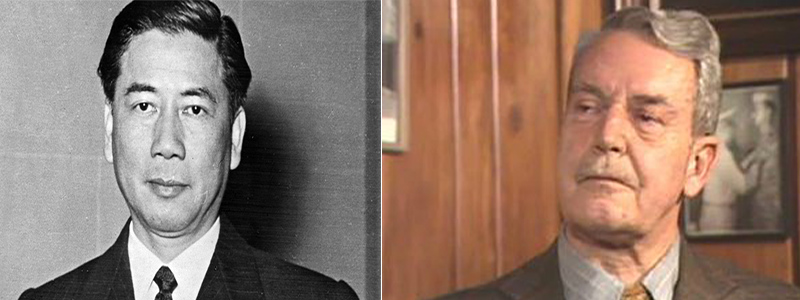
Now I’ll close with an example, but I think it’s an extremely pertinent one because it leads to what will follow me on this program: The case of Ngo Dinh Diem. When Diem assumed the power in Vietnam—1954—if you’ll remember, his country had no antecedent. It was simply a piece of real estate lying south of some seventeenth parallel. When you take over a piece of real estate like that and begin to rule: Who are your police? Who is your army? Who are your generals and who are your sergeants? Where is your power? This is important: Where is your power?
Ed Lansdale, probably one of the best agents the Agency ever set in motion, came over from the Philippines where he had created a man named Magsaysay as President of the Philippines, pretty good job as far as that went. And he brought his team with him to Saigon—I happened to be pilot on that airplane. We went into Saigon with the same what we used to call “Robin Hood” technique that: If you can fool the people, you can fool the people. And Diem was created by a secret police trained by Special Forces, the Green Berets, in those days I don’t think they wore the green berets, I’m talking about (19) 55, 56, 57.
And Diem owed his existence at the time to two clever maneuvers. One was the rapid placement of a good secret police and, secondly, the purchase of an army. Because, if you remember, there were two armies in Cholon that were more or less mercenaries and they purchased the army. Now as long as Diem had that backing he was in pretty good shape.
By the summer of 1963, a summer that we all could write about and research about a lot more, that was a very important summer, there were papers coming across my desk—at that time I was working in the office of the Joint Chiefs of Staff—papers with no “top secret” stamps on them, no “eyes only” stamps on them, no register numbers on them. That meant they were really secret; and if they’re really secret you don’t put anything on them. Then a man would come up to me and say, “Have you seen this?” And it [a note] would say: “We have had enough of Diem. What are we going to do about him?” Well, just that idea means that it won’t be long until bullets are flying. Because—what happens in Saigon—somebody like Lou Conien is told, “Hey go check out the Generals. Find out which general could take over the job. General ‘Big’ Minh or Ngyuen Khahn or Ky? Or Ky not ready, but Khahn or Minh might be ready, check them out.” The minute you tell people that in a city like Saigon—you could do it today—the minute you tell people that, they go back to their sources of power and they say, “Do you know what? The United States is changing its policy.” And it was changing its policy.
It’s like you stand on a stack of bibles; in fact, Chuck Colson and Howard Hunt tried to rewrite the stack of bibles to prove that is was Kennedy that said, “Shoot him.” But nobody in Washington said, “Shoot Diem.” You don’t do an assassination that way. The way people are assassinated is by taking away the power that has been created to keep them there. It’s a lot easier that way.
More interest to me than a genealogy of Lee Harvey Oswald and all the rest is, who said, “Lets go to Dallas, Jack?” I understand that Kenny O’Donnell feels real bad about it. I understand that Bobby Kennedy had said from time to time he wished he’d have put his foot down. Gerry Bruno, the greatest advance man in politics went there, but did Gerry Bruno pick the route? Maybe Mark can tell you. Who did? Who decided, “Let’s go to Dallas? You’ve been to Fort Worth; you’ve got to go to Dallas.” That’s important because whoever decided that knew some things.
I have worked with the Secret Service in their good work to keep presidents alive. I went to Mexico City when Eisenhower was going down there in 1956, and I’ll tell you, the Secret Service knows the game, like the guerrillas in France knew the game. They can keep the President alive. Where were they?
How does it happen you can have a six-story building with a lot of empty floors? And they neither wired nor sealed the doors as their manual says they will; nor had anybody on the roof with high powered guns and with radios as their manual says they will; or had a man in Dealey Plaza to look at the man on the roof and to look at the windows as their manual says they will? And if you don’t drive over 44 mph, a nice figure but it works out in tests, why did they bring that car down to a crawling speed? Those are more important to me than a genealogy of Lee Harvey Oswald and everybody else on the grassy knoll. I think I’ll stop there. That’s what I call the anatomy of assassination. It gets you thinking, you know. Thank you very much.
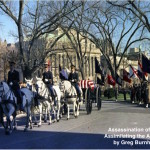
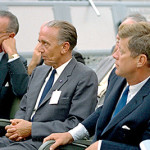

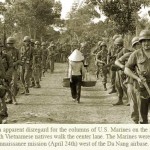


Fletcher Prouty knows the great game:
How does it happen you can have a six-story building with a lot of empty floors? And they neither wired nor sealed the doors as their manual says they will; nor had anybody on the roof with high powered guns and with radios as their manual says they will; or had a man in Dealey Plaza to look at the man on the roof and to look at the windows as their manual says they will? And if you don’t drive over 44 mph, a nice figure but it works out in tests, why did they bring that car down to a crawling speed? Those are more important to me than a genealogy of Lee Harvey Oswald and everybody else on the grassy knoll. I think I’ll stop there. That’s what I call the anatomy of assassination. It gets you thinking, you know. Thank you very much.
Who had the power to reach into the Secret Service?
Who did Prouty see with the Tramps?
Is that significant?
The most effective CIA agent ever put into the field.
And Helms. Prouty mentions the Shah. Helms set a time bomb for Nixon putting McCord on the Watergate operation. Helms monitored the Shaw Trial and destroyed Garrison. Helms is Michael Calder’s villain in the JFK assassination (JFK vs. CIA, 2000).
Fletcher Prouty: as close to the line as one could get.